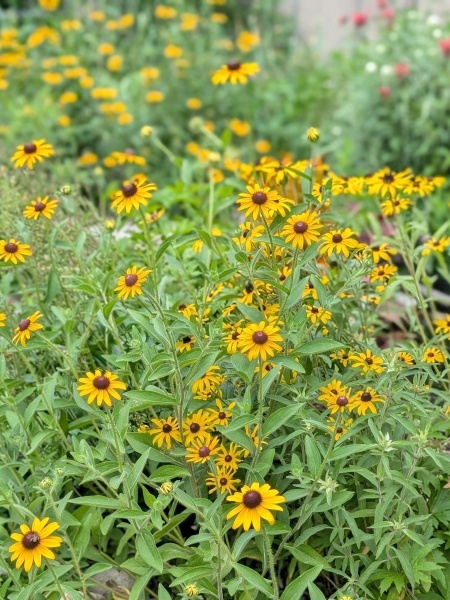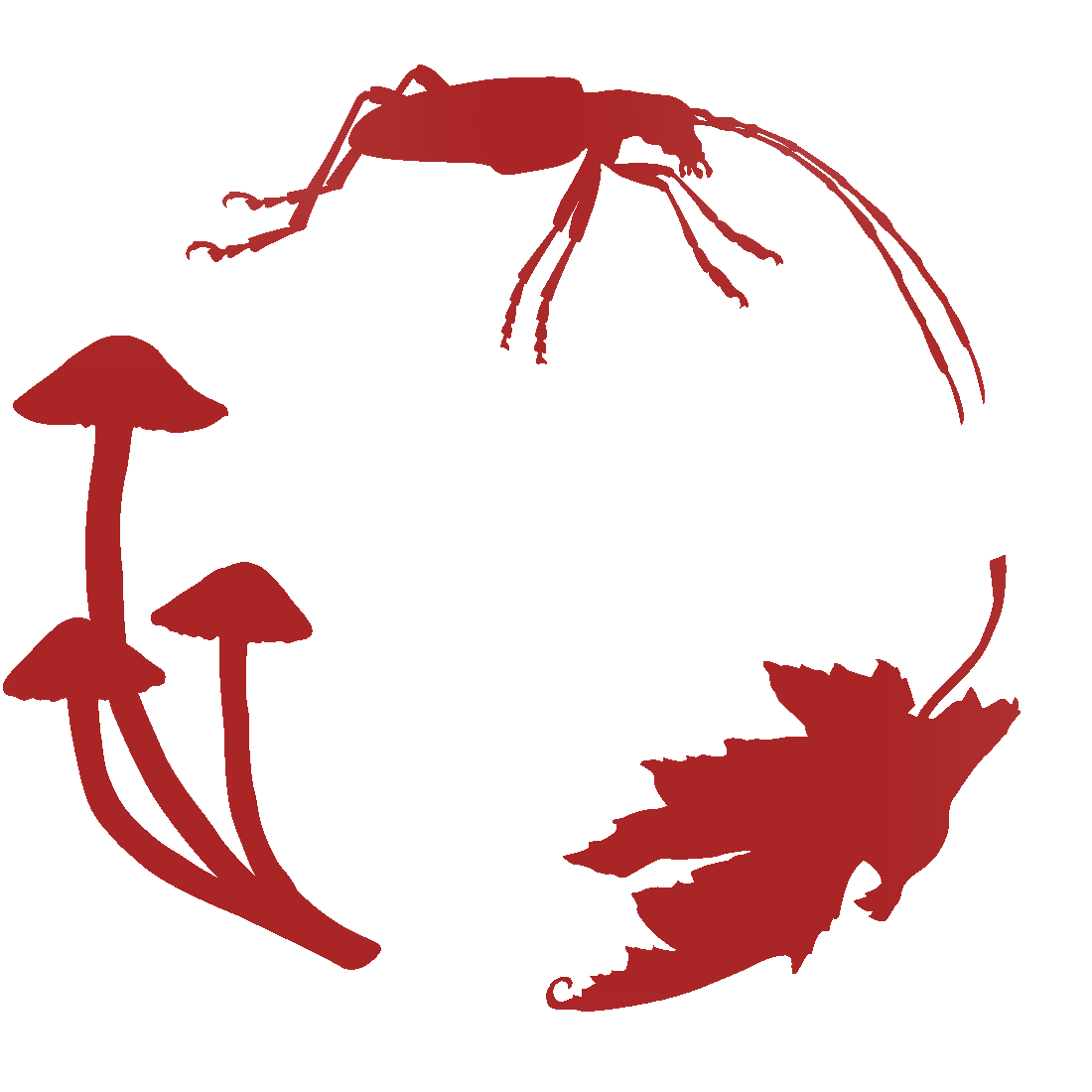
Source: Donna Bos
Rudbeckia hirta
Black-eyed Susan
Rudbeckie hérissée
Synonyms
hairy coneflower
marguerite jaune
rudbeckia hérissé
rudbeckie hirsute
Seeds in stock
Available at table Mixed Sun, Dry
Available at table Mixed Sun, Dry
We currently accept seeds for this plant
Bloom Colour: Yellow
Bloom Period: Jun - Sep
Max Height: 2.0 feet
Max Width: 1.0 feet
Light Condition:
 More than 6 hours of direct sun a day
More than 6 hours of direct sun a day
 More than 2 or 3 hours but less than 6 hours of direct sun a day
Soil conditions:
More than 2 or 3 hours but less than 6 hours of direct sun a day
Soil conditions:
 Tolerates dry soil condition
Tolerates dry soil condition
 Tolerates medium soil condition
Tolerates medium soil condition
 More than 6 hours of direct sun a day
More than 6 hours of direct sun a day
 More than 2 or 3 hours but less than 6 hours of direct sun a day
More than 2 or 3 hours but less than 6 hours of direct sun a day
 Tolerates dry soil condition
Tolerates dry soil condition
 Tolerates medium soil condition
Tolerates medium soil condition
Lifespan:
Biennial
plants that will take two years to bloom, and then will die
Gardener Experience:
 Suitable for beginner gardeners
Suitable for beginner gardeners
 Does not spread uncontrollably
Does not spread uncontrollably
 Easy to germinate
Easy to germinate
 Self-seeding
Self-seeding
 Suitable for beginner gardeners
Suitable for beginner gardeners
 Does not spread uncontrollably
Does not spread uncontrollably
 Easy to germinate
Easy to germinate
 Self-seeding
Self-seeding
Landscape Uses:
 Suitable for rock gardens
Suitable for rock gardens
 Suitable for Right of Way gardens
Suitable for Right of Way gardens
 Suitable for rain gardens
Suitable for rain gardens
 Suitable for shoreline rehabilitation
Suitable for shoreline rehabilitation
 Suitable for container garden
Suitable for container garden
 Suitable for school gardens
Suitable for school gardens
 Tolerates boulevard garden conditions
Tolerates boulevard garden conditions
 Suitable for rock gardens
Suitable for rock gardens
 Suitable for Right of Way gardens
Suitable for Right of Way gardens
 Suitable for rain gardens
Suitable for rain gardens
 Suitable for shoreline rehabilitation
Suitable for shoreline rehabilitation
 Suitable for container garden
Suitable for container garden
 Suitable for school gardens
Suitable for school gardens
 Tolerates boulevard garden conditions
Tolerates boulevard garden conditions
Ecological Benefits:
 Supports birds
Supports birds
 Supports pollinators
Supports pollinators
 Butterfly host
Butterfly host
 Bee host
Bee host
 Keystone species
Keystone species
 Supports birds
Supports birds
 Supports pollinators
Supports pollinators
 Butterfly host
Butterfly host
 Bee host
Bee host
 Keystone species
Keystone species
Tolerates:
 Tolerates drought conditions
Tolerates drought conditions
 Tolerates salt conditions
Tolerates salt conditions
 Deer resistant
Deer resistant
 Rabbit resistant
Rabbit resistant
 Tolerates foot traffic around the plant
Tolerates foot traffic around the plant
 Tolerates limestone conditions
Tolerates limestone conditions
 Tolerates sandy conditions
Tolerates sandy conditions
 Tolerates juglone conditions
Tolerates juglone conditions
 Tolerates transplantation
Tolerates transplantation
 Tolerates drought conditions
Tolerates drought conditions
 Tolerates salt conditions
Tolerates salt conditions
 Deer resistant
Deer resistant
 Rabbit resistant
Rabbit resistant
 Tolerates foot traffic around the plant
Tolerates foot traffic around the plant
 Tolerates limestone conditions
Tolerates limestone conditions
 Tolerates sandy conditions
Tolerates sandy conditions
 Tolerates juglone conditions
Tolerates juglone conditions
 Tolerates transplantation
Tolerates transplantation
Special Features and Considerations:
 This plant is septic tank safe
This plant is septic tank safe
 This plant is septic tank safe
This plant is septic tank safe
Plant Location
Native to Ottawa region: Yes
Distribution according to VASCAN

Ephemeral
Native
Introduced
Excluded
Extirpated
Doubtful
Absent
Thrives in Ecozones
- Taiga Plains
- Atlantic Maritime
- Taiga Shield
- Boreal Plains
- Montane Cordillera
- Prairies
- Boreal Shield
- Pacific Maritime
- Mixed Wood Plains
Ecological Benefits
Butterflies Supported by Rudbeckia hirta
No butterfly data available for this plant.
Specialized Bees Supported by Rudbeckia hirta
- Andrena aliciae
- Andrena rudbeckiae
- Complexe Colletes americanus
- Complexe Colletes compactus
- Megachile inimica
- Megachile pugnata
- Melissodes agilis
- Melissodes illatus
- Melissodes subillatus
- Melissodes trinodis
- Protandrena andrenoides
Plants that grow in similar conditions, that bloom at the same time.
Complementary Plants
- Anaphalis margaritacea
Pearly Everlasting
Immortelle blanche - Asclepias tuberosa
Butterfly Milkweed
Asclépiade tubéreuse - Liatris spicata
Dense Blazing Star
Liatris à épi - Monarda fistulosa
Wild Bergamot
Monarde fistuleuse - Schizachyrium scoparium
Little Bluestem Grass
Barbon à balais
Substitute For Non-Native Plants
- Oenothera fructicosa (Sundrops Cultivars)
- Helianthus (Non-Native Sunflower)
- NA (Black Eyed Susan's Cultivars)
- Rudbeckia Triloba (Brown Eyed Susan's)
- Echinacea (Coneflowers)
- Leucanthemum (Shasta Daisy)
- NA (Non-native False Sunflower)
Sowing Information
Download Seed Envelope Labels (PDF)
- Sowing depth: Sow just below surface
- Sow by March
- Stratification duration: 30 days
- Self-seeding
Harvesting and Seed Sharing
- Harvest start month: July
- Harvesting indicator:
- Seeds easily fall off when you gently pull them off
- Harvesting:
- Cut top edge then shake seeds off in bag or container with rock or equivalent
- Seed viability test:
- No test needed before donating
- Packaging measure: 1 rounded 1/32 teaspoon
- Seed storage:
- Air dry in paper bag or open container, for a few days until crisp
- Shake seeds to move them once in a while to prevent molding
- Cultivar: Yes, do not donate unless you know source, and there are no known cultivars in your garden or at proximity
- Remove non-seed material
- Harvesting video: Watch here
Toxicity Notes
Toxic to mammals if ingested.


 Canadensis
Canadensis
